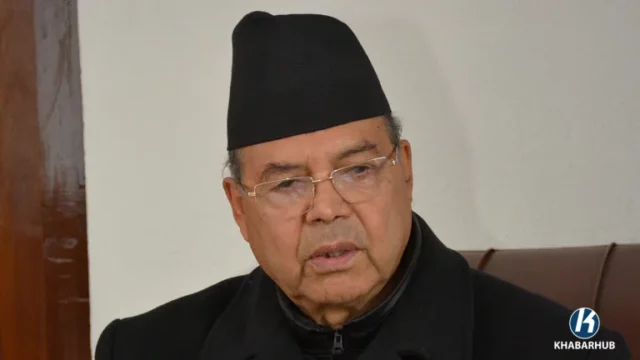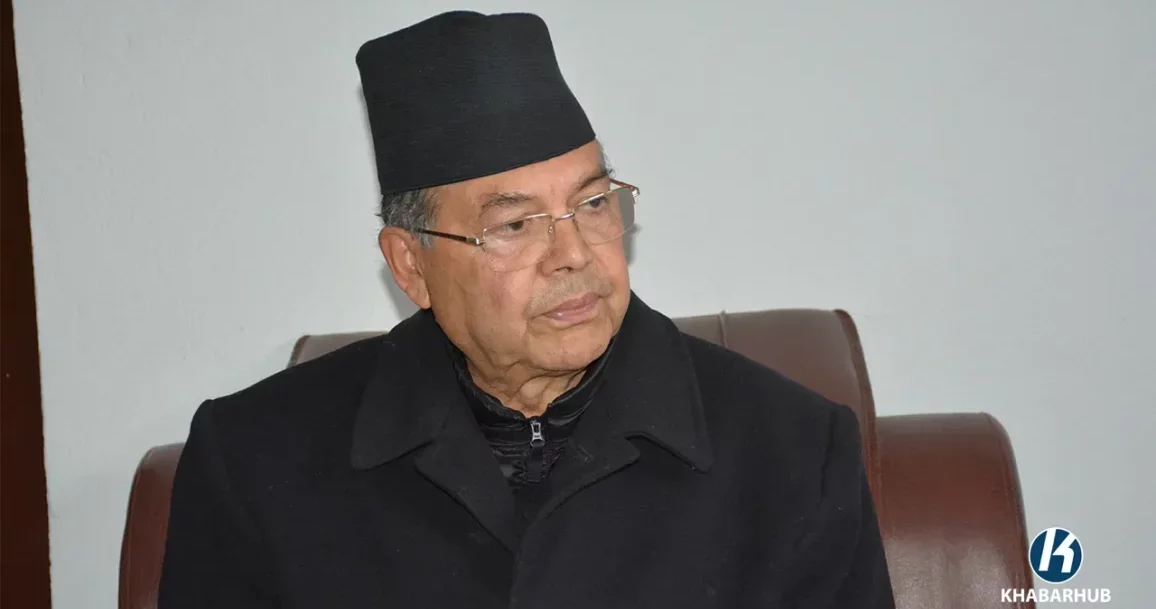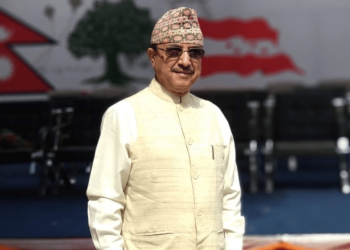KATHMANDU: Jhalanath Khanal, a distinguished figure in Nepali politics, renowned for his intellectual leadership and ever-present smile, opened up about the persistent influence of the older generation in Nepali politics.
In an exclusive interview with Khabarhub, the 74-year-old statesman, grappling with the challenges of Parkinson’s disease and post-kidney transplant medication, expressed his commitment to assume responsibility fueled by three decades of unwavering passion.
As our team visited his residence in Dallu, Khanal, seated amidst images of iconic Communist leaders such as Pushpalal Shrestha, Manmohan Adhikari, and Madan Bhandari, appeared ready to engage.
Despite visible signs of health struggles, Khanal’s determination to address the lingering dominance of older leaders in politics shone through.
Born as the seventh child in a family of 13, he fondly recalled being called ‘Jantare’ during his childhood.
This glimpse into Jhalanath Khanal’s life not only unveils the challenges he faces but also underscores his enduring dedication to shaping the political landscape of Nepal, emphasizing the need for a transition away from the influence of the older generation.
It’s not just a matter of being considered fortunate as the seventh child by birth; Khanal’s destiny also scripted a rare narrative where a political figure ascends to the position of the country’s executive head.
Khanal, a product of an inter-caste marriage with Rabilaxmi Chitrakar, has been immersed in politics since his teenage years, defying the aging process with an unwavering political vigor that highlights the role of self-esteem in enhancing life expectancy.
Despite the visual markers of time etched on his wrinkled cheeks and trembling hands, a natural query arises: What distinguishes the passionate Jhalnath of yesteryears from the present?
Before he could respond, he asserted, “No difference exists. The fervor I possessed at 30 persists undiminished at 74.”
Contrary to the constancy of zeal, the ironclad will that characterized his early years hasn’t wavered.
Khanal laments that certain Communist leaders in Nepal have deviated, becoming entangled in the web of broker capitalism.
Recognizing the need to bear the weight of their choices, he expresses an intensified resolve to forge ahead with heightened zeal, responsibility, and caution.
Professing the capability and courage to undertake any responsibility for the nation and its people, he draws a line at walking naively.
Despite the growing allure of youth in politics, Khanal remains skeptical.
He contends, “Politics doesn’t flow like a river in full spate. It demands experience, sagacity, and proficiency.”
This stance underscores his commitment to a seasoned approach in a political landscape that, he believes, hinges on wisdom and capability rather than youthful exuberance.
It has been two years since the inception of the Unified Socialist Party, a period marked by electoral tests and internal dynamics that have shaped the party’s trajectory.
The party faced local-level elections within six months of its establishment, followed by union and state elections, revealing a weakened position.

The consequence, according to Khanal, is the party’s inability to progress at a revolutionary pace, attributing this shortfall to leaders diverging from revolutionary goals.
Khanal takes a critical stance, stating, “The party couldn’t grow as it should have in a revolutionary way. Everyone bears responsibility for this.”
He attributes the party’s struggle to advance to a disconnect with revolutionary ideals, emphasizing that aligning with right-wing thinking hindered the anticipated strengthening of the party.
Unified Socialist’s Convention to Set Revolutionary Course
The United Socialist Party is set to hold its General Convention from January 28 to February 1, 2024, a pivotal event that Khanal believes will establish the revolutionary foundation of the party.
Anticipating a thorough review of the party’s weaknesses since its establishment, he asserts, “After building the party on a revolutionary foundation, it will move forward at a faster pace. The convention is the solution to existing problems.”
Factional Struggles within the Party
The United Socialist Party grapples with internal divisions, notably between factions led by Madhav Kumar Nepal and Jhalanath Khanal.
Khanal acknowledges the challenge posed by these factions, emphasizing an ongoing ideological debate rather than outright factionalism.
He notes, “There’s a right-wing incitement in the communist movement of Nepal, affecting integrated socialists. The party convention will address these issues, defining our revolutionary target and the process of unity.”
In the face of confusion and differing ideologies, Khanal remains optimistic that the party’s convention will pave the way for clarity, unity, and a renewed focus on revolutionary objectives.
Top of Form
Navigating Ideological Debates
Amidst debates on the ideological direction of the communist movement, Jhalnath Khanal reflects on the factors influencing a shift towards the right-wing path.
Acknowledging it as a matter of ongoing debate, he asserts, “Identifying the players in this shift is crucial. While some may consider the right path appealing, it’s a misconception; it stems from the ongoing class struggle.”
Addressing speculations about people leaving the party, Khanal counters with evidence of a continuous influx of members.
He states, “While discussions center on departures, arrivals persist. Just last Thursday, 500 individuals joined our party, and approximately 5,000 workers joined from the recently launched Mechi Mahakali Samajwadi Abhiyan.”
However, he concedes that the party’s developmental pace remains a concern.
In the realm of parliamentary politics, Khanal emphasizes the need for the communist movement to grow with revolutionary momentum, recalling the success of left unity in 2074 when two parties merged.
He advocates for collective progress with the right course of action for future victories.
Yet, he acknowledges the persistent challenge of ideological transformation, prompting a serious internal debate within his party.
Khanal asserts that the current era in Nepal is characterized by socialist revolution and transformation post-capitalist-democratic revolution.
He calls for public mobilization against broker capitalism, cautioning against prioritizing temporary alliances over the long-term goal of socialism.
Stressing the need for a broad united front to address public demands strategically, he warns of potential leadership pitfalls if communist parties don’t join forces in a broader left unity.
Expressing concern that failure to unite could lead to workers leaving the party, Khanal advocates for comprehensive reforms within the communist parties.
In his view, a cohesive and reformed approach is essential to navigate the complex political landscape and achieve the overarching goal of socialist transformation.
Navigating Political Dynamics and the Quest for Unity
When asked about the state of relations with the UML leadership, Khanal, known for his inclination toward collaboration, remarked, “The relationship with the UML has not improved in the sense you asked. I don’t see the relationship between the left improving. However, communication is ongoing, and at least that is a positive aspect.”
Reflecting on the formal situation of the country and the status of the communist movement, Khanal expressed uncertainty about planned meetings and a lack of dialogue between the parties.
Regarding obstacles in arranging meetings, he suggested directing inquiries to the UML while emphasizing his party’s resolution for unity among left-wing parties.
Khanal announced his support for broad left-wing unity as his established policy.
Looking ahead to the National Assembly elections, Khanal stressed the importance of maintaining alliances, stating, “Whoever wants to form an alliance will do it. This alliance remains in the election, producing results.”
Expressing dissatisfaction with the government’s performance, Khanal highlighted the inability to address public demands, leading to the emergence of new political forces.
He remarked, “Even though our party is in the government, I am not happy with the work done by the government.”
Addressing concerns about the government’s pardoning of criminals, Khanal questioned the government’s ability to run the country if it fails to evaluate criminals and ordinary people, expressing hope for gradual realization among the public.
Despite the likelihood of a by-election in Ilam Constituency-2, Khanal remains open to re-election, emphasizing his dedication to serving the country.
Unfazed by past electoral outcomes, he stated, “I don’t regret losing the 2079 election. I will work for the country, and no power can bind my hands or shut my mouth. I am not tired, and I will take any responsibility and fight if needed.”
In a call for self-reflection among political parties and leaders, Khanal urged corrective measures to address weaknesses arising from the actions of a few politicians.
He acknowledged the role of media, expressing respect for responsible reporting while criticizing misinformation.








Comment